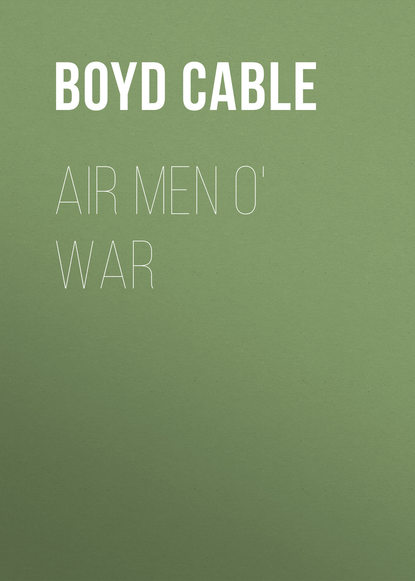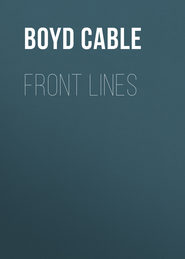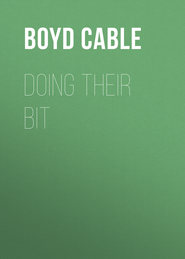По всем вопросам обращайтесь на: info@litportal.ru
(©) 2003-2024.
✖
Air Men o' War
Настройки чтения
Размер шрифта
Высота строк
Поля
"No," said Blanky shortly. "One or two down out of control, but I didn't watch 'em, and they probably straightened out lower down." (Blanky, it may be mentioned, has a record of never having claimed a single Hun crashed, but is credited, nevertheless, with a round dozen from entirely outside evidence.)
The Major spent another noisy three minutes trying to sift the tangled evidence and claims of crashes, then gave it up. "Write your reports," he said, "and we'll have to wait and see if any confirmation comes in of any crashes. You were near enough to the line for crashes to be seen, weren't you?"
"Near enough?" said Blanky. "Too disgustingly near. I suppose anyone that knows a bus from a banana would recognise the make of ours, and I'm rank ashamed to imagine what the whole blinking line must have thought of the Squadron and the paralysed performance."
The bir-r-r of the telephone bell cut sharply through the noisy talk, and the Major shouted for silence. He got it at last, and the room listened to the one-sided conversation that followed. Some of the men continued their talk in whispers, Blanky fumbled out and lit a cigarette, Dicky dropped on the bed beside the man with the book, who, through all the uproar, had kept his eyes glued to the magazine pages. "What you got there?" asked Dicky conversationally. "Any good?"
"Good enough for me to want to read," snapped the other. "But a man couldn't read in this row if he was stone deaf."
"Well, y'see, they're all a bit bucked with the scrap," said Dicky apologetically.
"Oh, bust the scrap," said the reader. "I'm sick of scraps and Huns. Do dry up and let me read," and he buried himself again in the fiction that to him at least was stranger than the naked truth that rioted about his unheeding ears.
The Major's end of the talk consisted at first of "Yes … yes … yes … oh, yes," and then, more intelligibly, "Yes, pretty good scrap evidently… No, they're all back, thanks… Thanks, I'm glad you think – what?.. Are you sure?.. Quite sure? Good. There's been rather an argument… Six? Quite certain?.. Thanks very much… I suppose you'll send a report confirming… Right. Thanks… Good-bye."
He put the receiver down on the stand and turned to Blanky with a smile twitching his lips. "Our Archies," he explained, "rang up to tell me they'd watched the whole show – " "Pretty sight, too," growled Blanky. The Major went on: "and to congratulate the Squadron on a first-class fight. And they positively confirm six crashes, Blanky; saw them hit the ground and smash. Some others seen low down out of control, and could hardly recover, but weren't seen actually to crash. So we only get six – and as the others only claim five, you must have got yours after all."
"Course he got it," struck in Blanky's observer; "only I knew he'd argue me down if I – "
"Oh, shut up," said Blanky. "How could you see? You were looking over the tail, anyway."
"Well, I knew I got mine," said Dicky.
"Me, too" … "And I was sure – " … "And I saw mine."
"For the love of Christmas, dry up," stormed Blanky. "If you could only fly as well as you can talk, you might make a half-baked blistering Flight. As it is you're more like a fat-headed flock o' incarnadined crows split-armin' over a furrow in a ploughed field. Of all the dazzling dud formations I ever saw – "
"Never mind, Blanky," said the Major. "You got six confirmed crashes amongst you, so it wasn't too dud a show."
"I don't care," said Blanky, tramping to the door and jerking it open. "I don't care a tuppenny tinker's dash what Huns we got." He swung through, and, turning in the doorway with his hand on the knob, shouted back with all the emphasis of last-word finality: "I tell you it was a ROTTEN formation, anyway."
Behind him the door slammed tremendously.
VI
QUICK WORK
It is difficult, if not indeed impossible, to convey in words what is perhaps the most breath-catching wonder of air-fighting work, the furious speed, the whirling rush, the sheer rapidity of movement of the fighting machines, and the incredible quickness of a pilot's brain, hand, and eye to handle and manœuvre a machine, and aim and shoot a gun under these speed conditions. I can only ask you to try to remember that a modern fast scout is capable of flying at well over a hundred miles an hour on the level, and at double that (one may not be too exact) in certain circumstances, and that in such a fight as I am going to try to describe here the machines were moving at anything between these speeds. If you can bear this in mind, or even realise it – I am speaking to the non-flying reader – you will begin to understand what air men-o'-war work is, to believe what a pilot once said of air fighting: "You don't get time to think. If you stop to think, you're dead."
When the Flight of half a dozen scout machines was getting ready to start on the usual "offensive patrol" over Hunland, one of the pilots, "Ricky-Ticky" by popular name, had some slight trouble with his engine. It was nothing much, a mere reluctance to start up easily, and since he did get her going before the Flight was ready to take off he naturally went up with it. He had a little more trouble in the upward climb to gain a height sufficient for the patrol when it crossed the line to stand the usual respectable chance of successfully dodging the usual Archie shells. Ricky, however, managed to nurse her up well enough to keep his place in the formation, and was still in place when they started across the lines. Before they were far over Hunland he knew that his engine was missing again occasionally and was not pulling as she ought to, and from a glance at his indicators and a figuring of speed, height, and engine revolutions was fairly certain that he was going almost full out to keep up with the other machines, which were flying easily and well within their speed.
This was where he would perhaps have been wise to have thrown up and returned to his 'drome. He hung on in the hope that the engine would pick up again – as engines have an unaccountable way of doing – and even when he found himself dropping back out of place in the formation he still stuck to it and followed on. He knew the risk of this, knew that the straggler, the lame duck, the unsupported machine, is just exactly what the Hun flyer is always on the look out for; knew, too, that his Flight Commander before they had started had warned him (seeing the trouble he was having to start up) that if he had any bother in the air or could not keep place in the formation to pull out and return. Altogether, then, the trouble that swooped down on him was his own fault, and you can blame him for it if you like. But if you do you'll have to blame a good many other pilots who carry on, and, in spite of the risk, do their best to put through the job they are on. He finally decided – he looked at the clock fixed in front of him to set a time and found it showed just over one minute to twelve – in one minute at noon exactly, if his engine had not steadied down to work, he would turn back for home.
At that precise moment – and this was the first warning he had that there were Huns about – he heard a ferocious rattle of machine-gun fire, and got a glimpse of streaking flame and smoke from the tracer bullets whipping past him. The Huns, three of them and all fast fighting scouts, had seen him coming, had probably watched him drop back out of place in the Flight, had kept carefully between him and the sun so that his glances round and back had failed to spot them in the glare, and had then dived headlong on him, firing as they came. They were coming down on him from astern and on his right side, or, as the Navals would put it, on his starboard quarter, and they were perhaps a hundred to a hundred and fifty yards off when Ricky first looked round and saw them.
His first and most natural impulse was to get clear of the bullets that were spitting round and over him, and in two swift motions he had opened his engine full out and thrust his nose a little down and was off full pelt. Promptly the three astern swung a little, opened out as they wheeled, dropped their noses, and came after Ricky, still a little above him, and so fairly astern that only the centre one could keep a sustained accurate fire on him. (A scout's gun being fixed and shooting between the blades of the propeller – gun and engine being synchronised so as to allow the bullet to pass out as the blade is clear of the muzzle – means that the machine itself must be aimed at the target for the bullets to hit, and the two outer machines of the three could only so aim their machines by pointing their noses to converge on the centre one – a risky manœuvre with machines travelling at somewhere about a hundred miles an hour.)
But the fire of that centre one was too horribly close for endurance, and Ricky knew that although his being end-on made him the smaller target, it also made his machine the more vulnerable to a raking shot which, piercing him fore and aft, could not well fail to hit petrol tank, or engine, or some other vital spot. He could do nothing in the way of shooting back, because, being a single-seater scout himself, his two guns were trained one to shoot straight forward through the propeller, the other, mounted on the top plane on a curved mount which allowed the gun to be grasped by the handle above his head and pulled back and down, to shoot from direct ahead to straight up. Neither could shoot backward.
Ricky, the first shock of his surprise over, had gauged the situation, and this, it must be admitted, was dangerous, if not desperate. He had dropped back and back from the Flight, until now they were something like a mile ahead of him. A mile, it is true, does not take a modern machine long to cover, but then, on the other hand, neither does an air battle take long to fight, especially with odds of three to one. With those bullets sheeting past him and already beginning to rip and crack through his wings, any second might see the end of Ricky. It was no use thinking longer of running away, and even a straight-down nose-dive offered no chance of escape, both because the Huns could nose-dive after him and continue to keep him under fire, and because he was well over Hunland, and the nearer he went to the ground the better target he would make for the anti-aircraft gunners below. He must act, and act quickly.
A thousand feet down and a quarter of a mile away was a little patch of cloud. Ricky swerved, dipped, and drove "all out" for it. He was into it – 400 yards remember – in about the time it takes you to draw three level quiet breaths, and had flashed through it – five or six hundred feet across it might have been – in a couple of quick heart-beats. The Huns followed close, and in that half-dozen seconds Ricky had something between fifty and a hundred bullets whizzing and ripping past and through his wings. As he leaped clear of the streaming wisps of the cloud's edge he threw one look behind him and pulled the joy-stick hard in to his stomach. Instantly his machine reared and swooped up in the loop he had decided on, up and over and round. At the first upward zoom Ricky had pulled down the handle of his top gun and brought it into instant action. The result was that as he shot up and over in a perfect loop the centre machine, which had been astern of him, flashed under and straight through the stream of his bullets.
Ricky whirled down in the curve of his loop with his gun still shooting, but, now he had finished his loop and flattened out, shooting up into the empty air while his enemy hurtled straight on and slightly downward ahead of him. Instantly Ricky threw his top gun out of action, and, having now reversed positions, and having his enemy ahead, steadied his machine to bring his bow gun sights to bear on her. But before he could fire he saw the hostile's right upper plane twist upward, saw the machine spin side on, the top plane rip and flare fiercely back and upward, the lower plane buckle and break, and the machine, turning over and over, plunge down and out of his sight. One of his bullets evidently had cut some bracing wires or stays, and the wing had given to the strain upon it.
So much Ricky just had time to think, but immediately found himself in a fresh danger. The two remaining hostiles had flashed past him at the same time as the centre one, while he threw his loop over it, but, realising apparently on the instant what his manœuvre was, they both swung out and round while he passed in his loop over the centre machine. It was smart work on the part of the two flanking hostiles. They must have instantly divined Ricky's dodge to get astern of them all, and their immediate circle out and round counteracted it, and as he came out of his loop brought them circling in again on him. For an instant Ricky was so concentrated on the centre machine that he forgot the two others; but, the centre one down and out, he was suddenly roused to the fresh danger by two following short bursts of fire which flashed and flamed athwart him, and caught a glimpse of the other two closing in again astern of him and "sitting on his tail."
Both were firing as they came, and again Ricky felt the sharp rip and crack of explosive bullets striking somewhere on his machine, and an instant later knew the two were following him and hailing lead upon him. He cursed savagely. He had downed one enemy, but here apparently he was little if any better off with two intact enemies in the worst possible position for him, "on his tail," and both shooting their hardest.
A quick glance ahead showed him the white glint of light on the wheeling wings of his Flight, attracted by the sight of his battle, circling and racing to join the fight. But, fast and all as they came, the fight was likely to be over before they could arrive, and with the crack and snap of bullets about him and his own two guns powerless to bear on the enemy, it looked uncomfortably like odds on the fight ending against him. Another loop they would expect and follow over – and the bullets were crippling him every instant.
Savagely he threw his controls over, and his machine slashed out and down to the right in a slicing two-hundred-foot side-slip. The right-hand machine whirled past him so close that he saw every detail of the pilot's dress – the fur-fringed helmet, dark goggles, black sweater. He caught his machine out of her downward slide, drove her ahead, steadied her, and brought his sights to bear on the enemy a scant twenty yards ahead, and poured a long burst of fire into her. He saw the streaking flashes of his bullets pouring about and over her top planes, dipped his muzzle a shade, and saw the bullets break and play on and about the pilot and fuselage. Then came a leaping flame and a spurt of black smoke whirling out from her; Ricky had a momentary glimpse of the pilot's agonised expression as he lifted and glanced wildly round, and next instant had only in his sight a trailing black plume of smoke and the gleam of a white underbody as the enemy nose-dived down in a last desperate attempt to make a landing before his machine dissolved in flames about him.
With a sudden burst of exultation Ricky realised his changed position. A minute before he was in the last and utmost desperate straits, three fast and well-armed adversaries against his single hand. Now, with two down, it was man to man – no, if he wished, it was all over, because the third hostile had swung left, had her nose down, and was "hare-ing" for home and down towards the covering fire of the German anti-aircraft batteries. Already she was two to three hundred yards away, and the first German Archie soared up and burst with a rending "Ar-r-rgh" well astern of him.
But Ricky's blood was up and singing songs of triumph in his ears. Two out of three downed; better make a clean job of it and bag the lot. His nose dipped and his tail flicked up, and he went roaring down, full out, after his last Hun. A rapid crackle of one machine-gun after another struck his ear before ever he had the last hostile fully centred in his sights. Ricky knew that at last the Flight had arrived and were joining in the fight. But he paid no heed to them; his enemy was in the ring of his sight now, so with his machine hurling down at the limit of speed of a falling body plus all the pull of a hundred and odd horse-power, the whole fabric quivering and vibrating under him, the wind roaring past and in his ears, Ricky snuggled closer in his seat, waited till his target was fully and exactly centred in his sights, and poured in a long, clattering burst of fire. The hostile's slanting nose-dive swerved into a spin, an uncontrolled side-to-side plunge, back again into a spinning dive that ended in a straight-downward rush and a crash end-on into the ground.
Whether it was Ricky or some other machine of the Flight that got this last hostile will never be known. Ricky himself officially reported having crashed two, but declined to claim the third as his. On the other hand, the rest of the Flight, after and always, with enthusiastic unanimity, insisted that she was Ricky's very own, that he had outplayed, outfought, and killed three Huns in single combat with them – one down and t'other come on. If Ricky himself could not fairly and honestly claim all rights to the last Hun, the Flight did for him.
"Three!" they said vociferously in mess that night, and would brook no modest doubts from him. And to silence all doubts the Squadron poet composed a song which was sung by the mess with a fervour and a generous slurring over of faulty metre (a word the poet didn't even know the meaning of) that might have stirred the blood of a conscientious objector. It was entitled, "Three Huns Sat on his Tail," and was sung to the tune of "There were Three Crows Sat on a Tree," or, as the uninitiated may prefer, "When Johnny Comes Marching Home," and it detailed the destruction of the Huns one by one, verse by verse.
When I tell you it was sung chanty fashion, with the first, second, and last lines chorused by the mess, I can leave you to imagine the loud-pedal, full, fortissimo effect of the "Hurrahs," and (helped out with feet, with fists, spoons, and anything else handy to resound upon the table) of the final rolling "Cr-r-r-ash."
There were three Huns sat on his tail,
Hurrah, hurrah!
But he looped over one and gave him "Hail
Colum-bi-a!"
He shot up the Hun so full of lead
That before he knew he was hit he was dead,
And our Archie look-out reporting said:
One! – CR-R-R-ASH!
But all this was later, and is going a little ahead of the story. As the last Hun went reeling down, Ricky, in the official language of the combat reports, "rejoined formation and continued the patrol." He pulled the stick towards him and rose buoyantly, knowing that he was holed over and over again, that bullets, and explosive bullets at that, had ripped and rent and torn the fabrics of his machine, possibly had cut away some strut or stay or part of the frame. But his engine appeared to be all right again, had never misbehaved a moment during the fight, was running now full power and blast; his planes swept smooth and steady along the wind levels, his controls answered exactly to his tender questioning touch. He had won out. He was safe, barring accident, to land back in his own 'drome; and there were two if not three Huns down on his brazen own within the last – how long?
At the moment of his upward zoom on the conclusion of the fight he glanced at his clock, could hardly believe what it told him, was only convinced when he recalled that promise to himself to turn back at the end of that minute, and had his belief confirmed by the Flight's count of the time between their first turning back and their covering the distance to join him. His clock marked exactly noon. The whole fight, from the firing of the first shot to the falling away of the last Hun, had taken bare seconds over the one minute.
That pilot was right; in air fighting "you don't get time to think."
Quick is the word and quick is the deed
If you would live in the air-fight game;
Speed, give 'em speed, and a-top of it – speed!
(Man or machine exactly the same).
Think and stunt, move, shoot, quickly; or die,
Fight quick or die quick; when all is said,
There are two kinds of fighters who fly,
Only two kinds – the quick, and the dead.
VII









